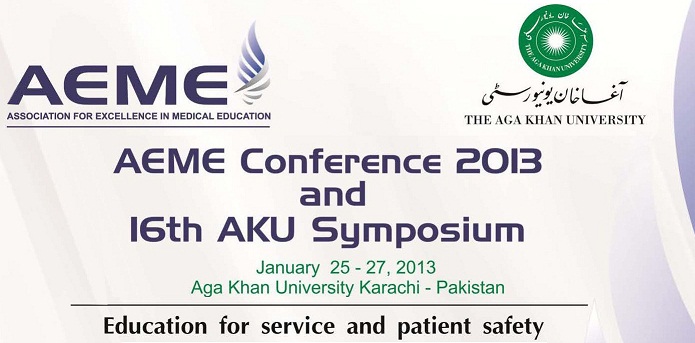Day 2 : Oral Presentations (Theme: Curriculum - Teaching & Learning)
Exploring teaching styles in an undergraduate medical college following traditional curriculum in Pakistan
Location
Lecture Hall 3
Start Date
27-1-2013 8:30 AM
Abstract
Context: Educational environment not only depends on curriculum, physical factors, teaching quality but also on an individual teacher’s role modelling, enthusiasm and teaching style.
Objectives: To find out the teaching style (TS) and its differences among teachers in a native medical college setup.
Methods: The descriptive cross-sectional study was carried out in 2011 at a private medical and dental college using traditional curriculum among 77 faculty members. Self-assessment Staffordshire Evaluation of Teaching Styles questionnaire (SETS) was used for data collection. SPSS version 15.0 was used for analysis of categorical variables and t-test and ANOVA was used to compare data variables.
Results: It was found that 36.4% teachers preferred all round flexible & adaptable TS. Further student centred, sensitive was 24.7%, official curriculum was 5.2%, straight facts no nonsense was 6.5%, big conference was 7.8%, one-off was1.3% and mixed was 18.2% in preference. All round flexible and adaptable was higher among females, senior faculty and clinical science when compared to males, junior faculty and basic sciences. However, females, junior faculty, and basic science teachers attained significantly higher in official curriculum TS scores when compared to males, senior faculty, and clinical science respectively. Similarly, basic science teachers attained significantly higher in big conference TS score as compared to clinical science teachers (p<0.05).
Conclusion: The study suggests that traditional curriculum does not support all round flexible and adaptable TS. While Gender, curriculum, teaching strategies, and faculty rank of the teacher influences TS. To train teachers, effective faculty development should be done in medical colleges.
Key words: Teaching, Undergraduate, Medical education, Teachers, Pakistan
Exploring teaching styles in an undergraduate medical college following traditional curriculum in Pakistan
Lecture Hall 3
Context: Educational environment not only depends on curriculum, physical factors, teaching quality but also on an individual teacher’s role modelling, enthusiasm and teaching style.
Objectives: To find out the teaching style (TS) and its differences among teachers in a native medical college setup.
Methods: The descriptive cross-sectional study was carried out in 2011 at a private medical and dental college using traditional curriculum among 77 faculty members. Self-assessment Staffordshire Evaluation of Teaching Styles questionnaire (SETS) was used for data collection. SPSS version 15.0 was used for analysis of categorical variables and t-test and ANOVA was used to compare data variables.
Results: It was found that 36.4% teachers preferred all round flexible & adaptable TS. Further student centred, sensitive was 24.7%, official curriculum was 5.2%, straight facts no nonsense was 6.5%, big conference was 7.8%, one-off was1.3% and mixed was 18.2% in preference. All round flexible and adaptable was higher among females, senior faculty and clinical science when compared to males, junior faculty and basic sciences. However, females, junior faculty, and basic science teachers attained significantly higher in official curriculum TS scores when compared to males, senior faculty, and clinical science respectively. Similarly, basic science teachers attained significantly higher in big conference TS score as compared to clinical science teachers (p<0.05).
Conclusion: The study suggests that traditional curriculum does not support all round flexible and adaptable TS. While Gender, curriculum, teaching strategies, and faculty rank of the teacher influences TS. To train teachers, effective faculty development should be done in medical colleges.
Key words: Teaching, Undergraduate, Medical education, Teachers, Pakistan

